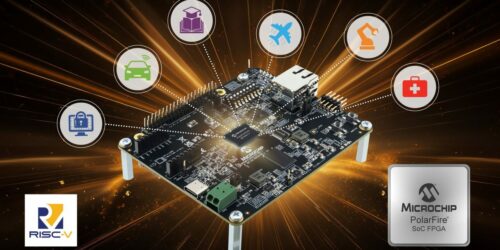The development kit is for embedded processing and compute acceleration, with a quad-core RISC-V processor, FPGA fabric, and support for Linux and real-time applications.

The embedded industry demands open-source RISC-V-based processor architectures, but commercial silicon or hardware options are limited. Microchip Technology has introduced the PolarFire SoC Discovery Kit to bridge this gap and foster innovation. The development kit is designed for embedded processing and compute acceleration. It includes a quad-core RISC-V processor that supports Linux and real-time applications, a range of peripherals, and 95K of FPGA logic elements. The kit enables testing of application concepts, firmware development, and programming and debugging user code, making technology accessible to engineers.
The Discovery Kit centres on the PolarFire MPFS095T SoC FPGA, featuring a microprocessor subsystem with a quad-core, 64-bit CPU cluster based on the RISC-V ISA. It includes a large L2 memory subsystem configurable for performance or deterministic operation and supports AMP mode. The board supports Microchip’s Mi-V ecosystem, a MikroBUS expansion header for Click Boards, a 40-pin Raspberry Pi connector, and an MIPI video connector. Expansion boards can be controlled using I2C and SPI protocols. An embedded FP5 programmer is included for FPGA fabric programming, debugging, and firmware application development.
The main features of the PolarFire SoC Discovery Kit are:
- PolarFire SoC FPGA with 95K LEs (MPFS095T-1FCSG325E )
- Four 64-bit RISC-V cores
- One GB main memory
- One Gigabit Ethernet
- Three UART
- One micro-SD interface
- Form factor 4.1” x 3.3”
“We are dedicated to helping support the growth of embedded systems that require low-power, high-performance FPGA fabrics. The PolarFire SoC Discovery Kit is a pivotal step in our journey towards creating more accessible, smart, secure and high-performing computing solutions for a wide range of applications,” said Shakeel Peera, vice president of marketing for Microchip’s FPGA business unit. “With the Discovery Kit, experienced and new design engineers, as well as university students, will have access to a low-cost RISC-V and FPGA development platform for learning and rapid innovation.”
For more information, click here.








